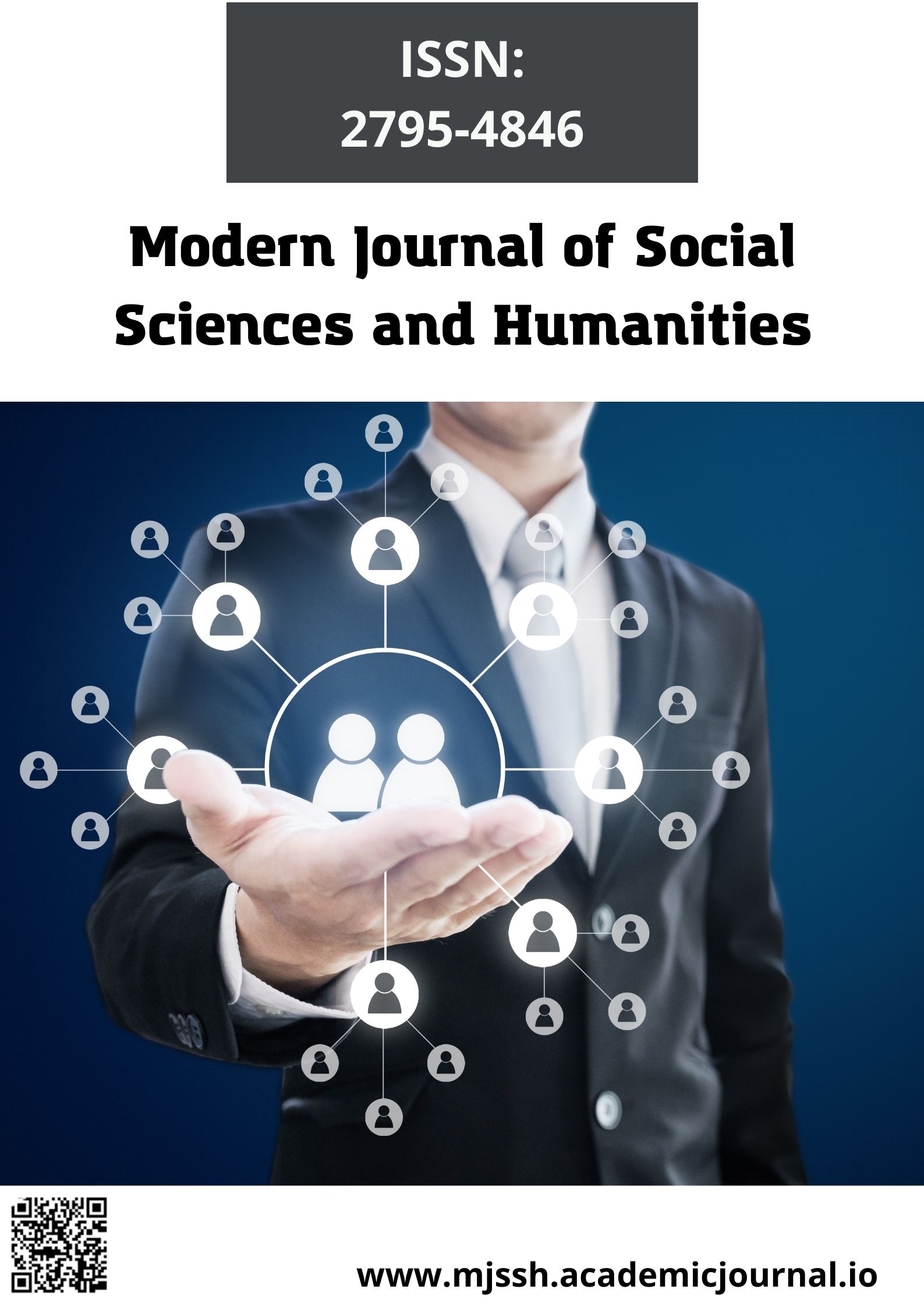LEXICAL AND SEMANTICAL CHARACTERISTICS OF ARABIC BORROWINGS USED IN "HAZRATI UMAR"
DOI:
https://doi.org/10.51699/mjssh.v1i5.232Keywords:
language, culture, people, Uzbek, Arabic, language unitsAbstract
The interaction of languages in the article. Stages of development of the Uzbek language, interaction at these stages, the influence of the Arabic language on the Uzbek language and, as a result, changes in the lexicology of the Uzbek language.
References
Omonov Muxtorjon Umarov ''Boburnoma"dagi izofiy birikmalarning lisoniy tadqiqi10.00.01-O'zbek til iFilologiya fanlari bo'yicha falsafa doktori(PhD) darajasini olish uchun tayyorlagan dissertatsiyasi.
O‘ZBEK TILIGA O’ZLASHGAN ARABCHA LEKSEMALAR VA ULARNING BADIIY ASARLARDA QO’LLANILISHI Yunusxon Rahmatullayev, NamDU katta o’qituvchisi
Ahmad Lutfiy Qozonchi "Saodat asri qissalari;Hazrati Umar(roziyallohu anhu) :diniy-ma‘rifiy/Ahmad Lutfiy Qozonchi - Qozonchi: "Book Media Shop" MChJ qoshidagi "Munir" nashriyoti,2021.
O`zbek tilining izohli lug`ati:-Toshkent. “O`zbekiston milliy ensiklopediyasi”.
''Hadis va Hayot'' Poklik kitobi. ''Sharqiy nashriyot - matbaa aktsiyadorlik kompaniyasi Bosh tahririyati Toshkent - 2008.
Amonov, M. U. (2021). On Arab borrowings, denoting the name of the profession, which is actively used in the Uzbek language. ISJ Theoretical & Applied Science, 11(103), 863-866.
Амонов, М. (2016). АЛИШЕР НАВОИЙ ҒАЗАЛЛАРИДА ҚЎЛЛАНИЛГАН АРАБИЙ ИЗОФАЛАРНИНГ ТУРЛАРИ. Актуальные научные исследования в современном мире, (6-1), 91-94.
Amonov, M., & Azizova, F. (2022). Thematic Groups of Arabic Words in Boburnoma. International Journal of Culture and Modernity, 13, 82-89.
Rustamovna, U. N., & Turdalievich, Z. M. (2020). Frame Structure of The Concept “GOLD” in Navoi's Poem “ISKANDER'S WALL”. Iranian Journal of Language Teaching Research, 9(16), 346-357.
Umarovich, A. M. (2021). The proportion of arabic isophical compounds in the “baburnoma” with the original. ACADEMICIA: AN INTERNATIONAL MULTIDISCIPLINARY RESEARCH JOURNAL, 11(2), 1554-1557.
Amonov, M. U. (2019). ACCORDANCE WITH THE ORIGINAL OF ISAFETIC COMBINATIONS IN “BABURNAMA”. Scientific Bulletin of Namangan State University, 1(8), 239-244.
Omonov, M. (2019). MORPHOLOGICAL FORMS OF PERSIAN IZAFET CONSTRUCTIONS IN “BABURNAME”. Theoretical & Applied Science, (11), 260-263.
Амонов, М. (2016). ТРАНСЛИТЕРАЦИЯ ИЗАФЕТНЫХ СОЧЕТАНИЙ В" БАБУРНАМЕ". Актуальные научные исследования в современном мире, (6-1), 95-98.
Нурманов, А., & Искандарова, Ш. (2008). Тилшунослик назарияси. Тошкент: Фан.
Искандарова, Ш. (1998). Лексикани мазмуний майдон асосида ўрганиш муаммолари. Т.: Фан, 7.
Iskandarova, S., & Tursunova, D. (2022). SEMANTICS OF ASSOCIATIVE RELATIONS IN THE POETRY OF ERKIN VOKHIDOV. Oriental Journal of Social Sciences, 2(02), 25-31.
Iskandarova, S. M., & Khudoykulova, U. A. (2016). EXPRESSING DIFFERENTIAL SEMES IN RIDDLES. Ученый XXI века, (3-4), 28-31.
Kuldashev, N., Avazbek, D., & Parviz, A. (2022). Opinions of Our Ancestors on Language and Speech Purity. Journal of Ethics and Diversity in International Communication, 2(4), 10-16.
Ibragimova, E. I., Zokirov, M. T., Qurbonova, S. M., & Abbozov, O. Q. “Filologiyaning dolzarb masalalari” mavzusidagi Respublika ilmiy-amaliy internet-konferensiya materiallari: Ilmiy ishlar to‟ plami.–Farg‟ ona, 2018.–113 sahifa.
Turdaliyevich, Z. M., & Farhod, I. (2022). Loiq Is the Successor of the Great Figures Of Tajik Literature. International Journal of Culture and Modernity, 14, 51-55.
Maftuna, G. (2022). Methodology of Organizing Problem Lessons in Higher Education. International Journal of Culture and Modernity, 14, 72-77.
Khamrakulova, S., & Zokirov, M. T. (2022). Phraseological units expressing old age of a human being in the English and Russian languages. ISJ Theoretical & Applied Science, 1(105), 280-283.
Zokirov, M. T. (2019). About the general characteristic of bilinguism. Scientific Bulletin of Namangan State University, 1(10), 260-265.
Zokirov, M. T. (2021). ABOUT THE INTERRELATIONSHIPS OF LINGUISTICS AND PSYCHOLOGY. Theoretical & Applied Science, (4), 422-425.
Turdaliyevich, Z. M. (2022). Actual Problems of Bilingualism in a Multi-Ethnic Environment. International Journal of Culture and Modernity, 13, 17-23.
Zokirov, M. (2007). Lingvistik interferensiya va uning o'zbek-tojik bilimimizda namoyon bo'lishi. MDA-Toshkent.
Zokirov, M., & Isomiddinov, F. (2020). December. ABOUT THE HOLES OF LANGUAGE LANGUAGE DICTIONARY. Конференции.
Kuldashev, N., Parviz, A., & Avazbek, D. (2022). Fazli Namangani's “Majmuai Shoiron” Review Zullisonayn Issue. Spanish Journal of Innovation and Integrity, 6, 429-433.
Maftuna, G., Muhabbat, U., & Abdumalik, S. (2022). The Method of Onomastic Conversion in the Formation of Toponimes in the Fergana Region. Spanish Journal of Innovation and Integrity, 6, 451-456.
Ibragimova, E. I., & Sharafutdinova, N. K. (2020). Typology of speech two heroes’. ISJ Theoretical & Applied Science, 04 (84), 682-686.
Ibragimova, E. I. (2020). Aesthetic function of relationships of the addressant. ISJ Theoretical & Applied Science, 05 (85), 101-104.
Sayyora, Q. (2022). FORMATION OF TEXT ANALYSIS IN LINGUISTICS. Modern Journal of Social Sciences and Humanities, 4, 58-61.
Nurmonov, A., & Hakimov, M. (2001). Theoretical formation of linguistic pragmatics. Uzbek language and literature, 4, 54-58.
Hakimov, M. (2001). Pragmatic interpretation of the text in Uzbek language. Author's abstract of the dissertation of the doctor of philological sciences. Tashkent.
Абдурахмонова, Н., & Абдувахобов, Г. (2021). O ‘QUV LUG ‘ATINI TUZISHNING NAZARIY METODOLOGIK ASOSLARI. МЕЖДУНАРОДНЫЙ ЖУРНАЛ ИСКУССТВО СЛОВА, 4(6).
Abduvahobov, G. (2021). About the concept of computer lexicography. ISJ Theoretical & Applied Science, 06 (98), 664-668.
Қўлдашев, Н. А. ТИЛ ҲОДИСАЛАРИГА ЭКОЛОГИК ЁНДАШУВ. УЧЕНЫЙ XXI ВЕКА Учредители: Общество с ограниченной ответственностью Коллоквиум, (2), 22-24.
Dusmatov, K. (2017). About the Art of Askiya. ANGLISTICUM. Journal of the Association-Institute for English Language and American Studies, 32-38.
DUSMATOV, H. H., & HUSANOVA, M. (2021). SOME STYLISTIC EVENTS EXPRESSED IN UZBEK ANECDOTES. THEORETICAL & APPLIED SCIENCE Учредители: Теоретическая и прикладная наука, (12), 505-508.
Dosmatov, H. (2020). About some features of uzbek jokes. In Конференции.
Ismoil, H., Mukhtorali, Z., Jumaboy, J., & Parviz, A. (2022). WORD FORMATION FROM THE TAJIK BORROWINGS. Modern Journal of Social Sciences and Humanities, 5, 71-76.
Qizi, G. S., & Umarova, N. R. (2021). The use of anthroponyms and pseudonyms in alisher Navoi's gazelles. ACADEMICIA: An International Multidisciplinary Research Journal, 11(9), 349-353.
Mukhtorali Turdaliyevich Zokirov, Sohiba Mukhtoraliyevna Zokirova (2021). About The Influence Of The Uzbek Language In Rishtan Tajik Dialects Of Ferghana Region. Turkish Online Journal of Qualitative Inquiry (TOJQI 12 (4), 115-122.






